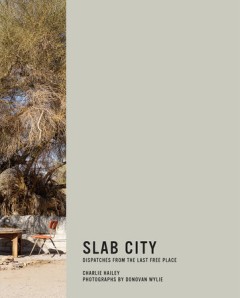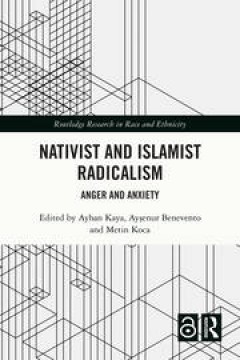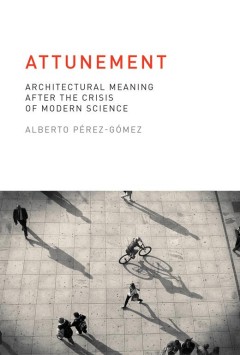Filter by

Electric Light: An Architectural History
How electric light created new spaces that transformed the built environment and the perception of modern architecture. In this book, Sandy Isenstadt examines electric light as a form of architecture—as a new, uniquely modern kind of building material. Electric light was more than just a novel way of brightening a room or illuminating a streetscape; it brought with it new ways of perceivin…
- Edition
- -
- ISBN/ISSN
- 9780262347310
- Collation
- -
- Series Title
- -
- Call Number
- -

Slab City: Dispatches from the Last Free Place
An architect and a photographer explore a community of squatters, artists, snowbirds, migrants, and survivalists inhabiting a former military base in the California desert. Under the unforgiving sun of southern California's Colorado Desert lies Slab City, a community of squatters, artists, snowbirds, migrants, survivalists, and homeless people. Called by some “the last free place” and by…
- Edition
- -
- ISBN/ISSN
- -
- Collation
- -
- Series Title
- -
- Call Number
- -

Overgrown: Practices between Landscape Architecture and Gardening
A call for landscape architects to leave the office and return to the garden. Addressing one of the most repressed subjects in landscape architecture, this book could only have been written by someone who is both an experienced gardener and a landscape architect. With Overgrown, Julian Raxworthy offers a watershed work in the tradition of Ian McHarg, Anne Whiston Spirn, Kevin Lynch, and J. B…
- Edition
- -
- ISBN/ISSN
- 9780262348263
- Collation
- -
- Series Title
- -
- Call Number
- -

Nativist and Islamist Radicalism
ABSTRACT This book analyses the factors and processes behind radicalisation of both native and self-identified Muslim youths. It argues that European youth responds differently to the challenges posed by contemporary flows of globalisation such as deindustrialisation, socio-economic, political, spatial, and psychological forms of deprivation, humiliation, and structural exclusion. The book …
- Edition
- -
- ISBN/ISSN
- 9781003309840
- Collation
- -
- Series Title
- -
- Call Number
- -

Attunement: Architectural Meaning after the Crisis of Modern Science
How architecture can move beyond the contemporary enthusiasms for the technically sustainable and the formally dazzling to enhance our human values and capacities. Architecture remains in crisis, its social relevance lost between the two poles of formal innovation and technical sustainability. In Attunement, Alberto Pérez-Gómez calls for an architecture that can enhance our human values an…
- Edition
- -
- ISBN/ISSN
- 9780262333320
- Collation
- -
- Series Title
- -
- Call Number
- -

Design Unbound: Designing for Emergence in a White Water World, Volume 1: Des…
Tools for navigating today's hyper-connected, rapidly changing, and radically contingent white water world. Design Unbound presents a new tool set for having agency in the twenty-first century, in what the authors characterize as a white water world—rapidly changing, hyperconnected, and radically contingent. These are the tools of a new kind of practice that is the offspring of complexity sci…
- Edition
- -
- ISBN/ISSN
- 9780262349031
- Collation
- -
- Series Title
- -
- Call Number
- -

Downtime on the Microgrid: Architecture, Electricity, and Smart City Islands
Something good about the smart city: a human-centered account of why the future of electricity is local. Resilience now matters most, and most resilience is local—even for that most universal, foundational modern resource: the electric power grid. Today that technological marvel is changing more rapidly than it has for a lifetime, and in our new grid awareness, community microgrids have be…
- Edition
- -
- ISBN/ISSN
- 9780262357005
- Collation
- -
- Series Title
- -
- Call Number
- -

Tower to Tower: Gigantism in Architecture and Digital Culture
- Edition
- -
- ISBN/ISSN
- 9780262358330
- Collation
- -
- Series Title
- -
- Call Number
- -
- Edition
- -
- ISBN/ISSN
- 9780262358330
- Collation
- -
- Series Title
- -
- Call Number
- -

In the Images of Development: City Design in the Global South
The urban legacy of the Global South since the colonial era and how sustainable development and environmental and social justice can be achieved. Remarkably little of the expansive literature on development and globalization considers actual urban form and the physical design of cities as outcomes of these phenomena. The development that has shaped historic transformations in urban form and …
- Edition
- -
- ISBN/ISSN
- 9780262361118
- Collation
- -
- Series Title
- -
- Call Number
- -

Paris and the Parasite: Noise, Health, and Politics in the Media City
The social consequences of anti-parasitic urbanism, as efforts to expunge noise and biological parasites penalize those viewed as social parasites. According to French philosopher Michel Serres, ordered systems are founded on the pathologization of parasites, which can never be fully expelled. In Paris and the Parasite, Macs Smith extends Serres's approach to Paris as a mediatic city, asking…
- Edition
- -
- ISBN/ISSN
- 9780262363068
- Collation
- -
- Series Title
- -
- Call Number
- -
 Computer Science, Information & General Works
Computer Science, Information & General Works  Philosophy & Psychology
Philosophy & Psychology  Religion
Religion  Social Sciences
Social Sciences  Language
Language  Pure Science
Pure Science  Applied Sciences
Applied Sciences  Art & Recreation
Art & Recreation  Literature
Literature  History & Geography
History & Geography